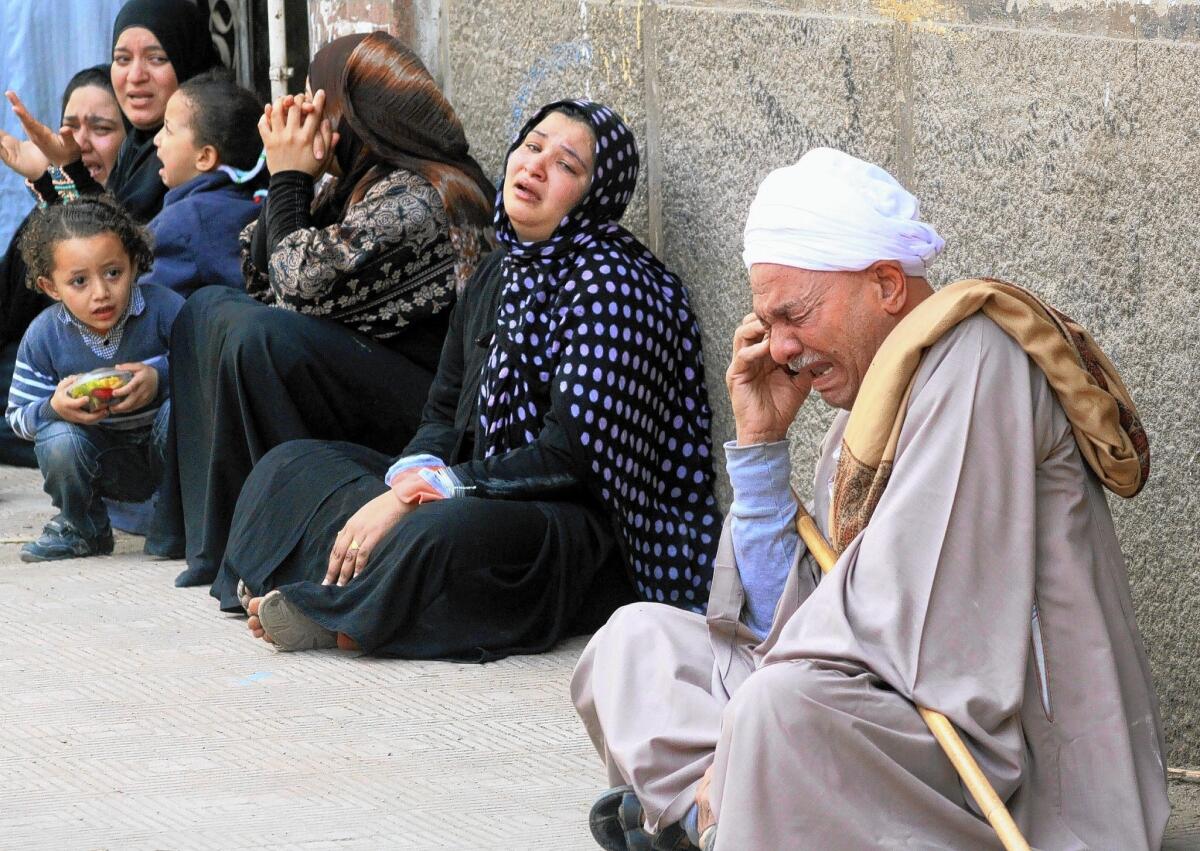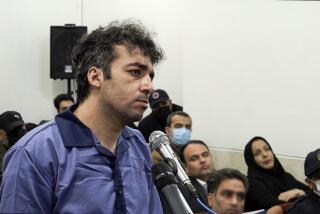Egypt sentences group of 529 to death

- Share via
CAIRO — Even by the baroque standard being set by the Egyptian judiciary under the nearly 9-month-old military-backed government, the scene that unfolded Monday in a courthouse south of the capital was extraordinary: 529 defendants simultaneously sentenced to death.
The verdict, which drew widespread condemnation and expressions of incredulity from human rights groups and legal organizations, was handed down at just the second session of a mass trial of nearly 550 men. The defendants, described as supporters of ousted Islamist President Mohamed Morsi, were accused of acts of violence including attacking a police station and killing a police officer.
Sixteen defendants were acquitted, Egypt’s state news agency reported. It was not immediately clear how the death penalties related to the slaying of the officer.
Outside the criminal court in Minya, a Nile River Valley city about 150 miles south of Cairo, relatives wailed in dismay at word of the capital sentence for their loved ones, some of whom had been in jail since late summer.
Legal experts said the ruling was unlikely to stand. It can be appealed to higher courts, and would have to be ratified by the grand mufti, Egypt’s top Islamic jurist. Only about 120 of the defendants are in custody, with the remainder either fugitives or out on bail, lawyers said.
The case has its roots in a particularly wrenching episode. Violence erupted across Egypt in mid-August after police and soldiers moved against protest camps set up by Morsi’s followers, killing hundreds of them. Some Islamists launched retaliatory attacks against police and Coptic Christians, who were widely blamed by Morsi supporters for backing the army’s takeover of the government in early July. Minya has a large Coptic community.
Harsh penalties for offenses such as taking part in a street protest or posting criticism of the government on social media have become common under the interim government, which took power after Morsi’s ouster. At least 16,000 people have been arrested since July, by official government counts.
Many of these are being held without charges, and many more are being tried en masse. An even larger group is due in Minya’s criminal court Tuesday.
Lawyers said it was unprecedented for a court to decree the death penalty for such a large number of defendants at once. Amnesty International, one of many domestic and international rights groups to speak out against Monday’s verdict, called it “grotesque.”
“This is the largest single batch of simultaneous death sentences we’ve seen in recent years, not just in Egypt but anywhere in the world,” said Hassiba Hadj Sahraoui, deputy director of the organization’s Middle East and North Africa program.
Even before this case, judicial practices under the military-led government have been broadly criticized by activists and Western governments concerned about the lack of due process at a time when Egypt’s prisons are full to overflowing. Defense lawyers frequently say they are not allowed to make arguments or call witnesses.
Morsi is on trial in Cairo, with overlapping court proceedings on charges ranging from poultry rustling to espionage. Several of the counts levied against him could carry the death penalty.
The Muslim Brotherhood, of which Morsi is a member, was declared a terrorist organization in December, and that designation has been used to support serious charges against not only pro-Morsi protesters but also figures such as activists, bloggers, filmmakers, academics and journalists.
In one such case, three journalists from the English-language branch of the broadcaster Al Jazeera were arrested, and they had the third session of their trial Monday. They and 17 others are accused of terrorism-related charges. Interim President Adly Mansour last week had assured the family of one of the defendants, Australian Peter Greste, that there would be a speedy resolution of the case.
But the three, who have been in jail since their hotel-suite offices were raided Dec. 29, were again denied bail Monday.
This week did see the release of one high-profile prisoner: Prominent blogger and leading figure in the 2011 revolution Alaa Abdel Fattah, jailed since November, was granted bail Sunday. On Monday, he tweeted about being able to change his infant son’s diapers after nearly four months away from his family.
Special correspondent Amro Hassan contributed to this report.
More to Read
Sign up for Essential California
The most important California stories and recommendations in your inbox every morning.
You may occasionally receive promotional content from the Los Angeles Times.









